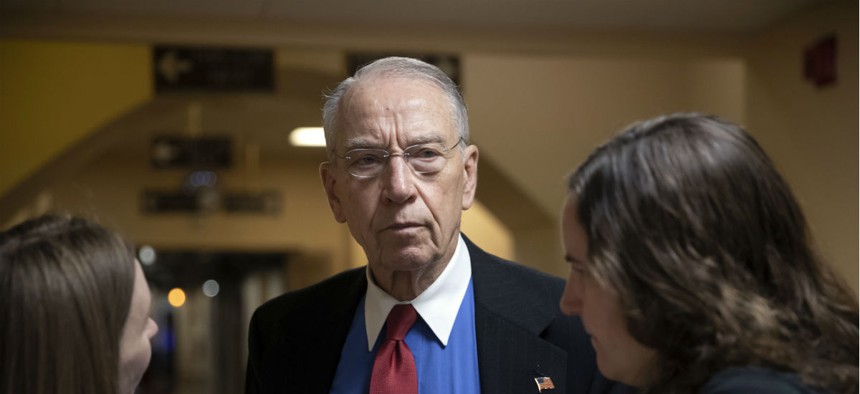Grassley Delays Nominee for Top Counterintelligence Post
The senator tied Evanina’s confirmation to the release of documents related to the Russia investigation and the firing of the whistleblower ombudsman.
In another clash between the Senate Judiciary chairman and the Office of the Director of National Intelligence, Sen. Chuck Grassley, R-Iowa, on Monday placed a hold on President Trump’s nominee to be the first Senate-confirmed director of the National Counterintelligence and Security Center.
His reasons? Dissatisfaction with cooperation in document production from the office of Dan Coats, director of ODNI, regarding the FBI and Justice Department’s handling of probes into the 2016 election, as well as the case of fired intelligence community whistleblower ombudsman Dan Meyer.
In a statement published on June 4 in the Congressional Record, Grassley announced that he had no objections to the qualifications of Bill Evanina, who has served as National Counterintelligence Executive since 2014 and whom Trump in February nominated for the director position.
“The committee needs to more fully understand the meaning of the apparent references to Mr. Evanina” in the now widely disseminated private text messages between FBI colleagues Peter Strzok and Lisa Page, Grassley said. “An individual named ‘Evanina’ is mentioned in the context of government officials having briefed then-Vice President-elect Pence on national security related issues and planning to brief him a second time. The name was redacted from text messages initially provided to Congress.”
Grassley has waded into the ongoing clash between House lawmakers and the Trump Justice Department over how much material related to the probe of possible collusion with Russia can be shared, and he said in his “hold” announcement that his committee has “experienced increasing difficulty in obtaining relevant documents and briefings.”
Grassley then pivoted to the Meyer case, noting that he and colleagues have been asking ODNI since last November for information on why the intelligence community inspector general’s whistleblower outreach program had been decentralized by acting leaders who ordered the “highly unusual and problematic termination” of Meyer as Executive Director for Whistleblowing and Source Protection. Despite negotiations that included offers of staff briefings, Grassley wrote that “to date, I still have received nothing.”
Finally, Grassley raised a third query on Evanina, asking why he apparently never followed up on the request made in 2015 by the counsel in the intel community IG’s office that he develop new policies to prevent retaliatory security clearance actions. “I would like for Mr. Evanina to explain the status of those efforts,” the senator said.
Grassley has also placed a hold on the nominee for general counsel at the IC watchdog’s office.
Asked for comment, ODNI Coats told Government Executive in an emailed statement, “There is no question that Bill Evanina is eminently qualified to serve as the first-ever Senate confirmed Director of the National Counterintelligence and Security Center, as evidenced by his unanimous bipartisan approval by the Senate Select Committee on Intelligence. The Intelligence Community takes seriously its obligation to keep Congress currently and fully informed, and any suggestion that we do not fulfill this obligation is misplaced. We look forward to resolving any concerns on this and other pending nominations with Senator Grassley and the intelligence oversight committees as quickly as possible.”
Despite disgruntlement over Meyer’s firing among some senators and advocates in the whistleblower community, Coats has previously expressed support for having a robust outreach program. In May, after the Senate confirmed Michael Atkinson as the new intel community inspector general, Coats’s statement said, “I look forward to working with Michael in his new role and trust he will execute the statutory authorities of his position to the fullest to ensure there is not waste, fraud, or abuse in the IC—and to maintain the strength and integrity of our whistleblower program.”
As Atkinson settles in, the acting officials in his office—Wayne Stone and Jeanette McMillian—are moving to other jobs, and Meyer has told associates he’s still hoping to return in some capacity.
On April 27, a Merit Systems Protection Board administrative judge dismissed Meyer’s general termination case on jurisdictional grounds, but acknowledged that MSPB jurisdiction may exist under veterans preference statutes. Meyer continues to press with Equal Employment Opportunity and Labor Department investigations of a termination for which no public reason has been provided.
Irvin McCullough, a national security analyst who follows whistleblower issues for the nonprofit Government Accountability Project, told Government Executive, “Congressional holds are an effective mechanism for accountability. Senator Grassley cited an unwillingness on behalf of the executive branch to cooperate with a number of his inquiries. Hopefully, by putting more pressure on the Intelligence Community, their leaders will step out from the shadows and explain why they’ve gutted a formerly effective whistleblowing program.”
NEXT STORY: Be a Role Model Like Tom Hanks




